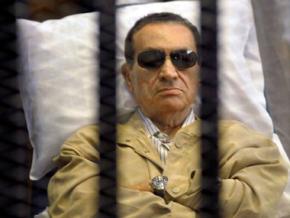Mubarak gets away with murder
The forces of counterrevolution in Egypt are celebrating again, reports .
AN EGYPTIAN court has dismissed murder charges against Egyptian dictator Hosni Mubarak for the deaths of protesters killed by security forces during the 2011 uprising that led to Mubarak's ouster. Despite a suffocating crackdown on all forms of dissent, a few thousand people braved the closure of Tahrir Square with tanks, armored personnel carriers and barbed wire, and gathered nearby to condemn the court's decision.
The November 29 ruling caps a dramatic reversal of fortune for the despised U.S.-backed dictator, who was sentenced to life in prison in June 2012 for his role in the killing of more than 1,000 protesters during the 2011 uprising that ousted him from power. During his 30 years in office, Mubarak ruled Egypt with an iron fist, while he, his family and his close inner circle amassed personal fortunes in the billions.
During the protest, Egyptian security forces killed two and arrested at least 85 people for violating the protest law, which stipulates that the interior ministry must be notified at least three days prior to holding any protest. The day after the ruling, students across Egypt held protests and clashed with police in Cairo, Zagazig and Assiut.

Hours after the verdict, Mubarak was gloating and defending his decades in power during a telephone interview with a local television station. "I felt I did nothing wrong at all," said Mubarak. "I was waiting to find out what they will come up with this time. It was an innocent verdict. I did nothing wrong at all."
Predictably, Field-Marshall-turned-President Abdul-Fattah el-Sisi sought to downplay the significance of Mubarak's acquittal, issuing a statement that Egypt must "look to the future" and "cannot ever go back." Meanwhile, Sisi has sought to perfect the same tools of state repression--a wide-reaching network of secret police, a servile judicial system and a sycophantic media--that Mubarak used to maintain the subjugation of millions of impoverished Egyptians.
But Mubarak's supporters are celebrating this ruling precisely because they understand the importance it holds for the future. Political scientist Gamal Abdel-Gawwad, who was close to the Mubarak regime in the closing years of his rule, said:
I think it will make the police forces feel more comfortable and more confident about the lack of possible legal repercussions for executing commands to use force against demonstrators who aim to violate the protest law, whether we like it or not, or to undermine the state...The sense of hesitation that marked the performance of the police since the end of the January 2011 Revolution and the arrest of all top figures of the Ministry of Interior should now come to an end.
Sisi's most recent "accomplishment" in his crackdown on dissent of any kind was an October 26 statement by 17 state and private newspapers that amounted to an oath of loyalty to the Egyptian state. The statement said that it condemned "attempts to doubt state institutions or insult the army or police or judiciary in a way that would reflect negatively on these institutions' performance."
The cries of outrage at such a blatant encroachment on the right to free speech were few and far between, which made a recent statement signed by more than 350 Egyptian journalists condemning the pledge all the more noteworthy. The oath agreed to by the 17 news outlets "does not distinguish between fighting terrorism and initiating a new fascism," said the journalists' November 2 statement.
MUBARAK'S JUDICIAL victory has darkened the mood throughout Egypt, leading many to ask sarcastically that if Mubarak didn't kill those protesters, who did? Sharif Abdel Kouddous, Democracy Now!'s Cairo correspondent, captured this sentiment in his December 1 interview with Amy Goodman:
Many people weren't that surprised by the ruling, given the nature of the judiciary we have seen over the past year, given the nature of the political situation in Egypt right now. Many were surprised at their capacity to still feel anger and indignation and to be disappointed and upset by this verdict--to see not only Mubarak, but Habib el-Adly, his interior minister, and the top police chiefs all be acquitted and basically no one being held responsible after scores of police officers have been acquitted by trials as well.
Hardly anyone being held responsible for the killing of nearly 1,000 people in this uprising, and we are supposed to chalk it up to something like mass suicide? So it's a very difficult moment, and again, I think, a dark one in Egypt's history.
The main refrain we have been hearing is, "So who's the killer?" Because everyone has gotten off scot free...Mubarak is fair game for most people--it's safe for a lot of these [news] anchors to speak out against him--but still it was a change of tone from the sycophantic coverage that we've seen...
There is very little space for any kind of dissent, any kind of opposition right now in Egypt. You risk years in prison, you risk your life by going down on the streets...This really portrays an alarmingly selective justice system in Egypt. The day after this ruling, 25 Muslim Brotherhood leaders got three years in prison for chanting in a trial, and a week before 78 minors got two to five years in prison for protesting.
None of this, of course, has stopped the U.S. from continuing to supply Sisi's regime with hundreds of millions of dollars in military aid.
But the ruling, if anything, confirms that Sisi isn't offering a new Egypt with a possible democratic future, but rather a warm regard for its repressive past. As a result, the anger that propelled the 2011 uprising in the first place still seethes, even if, for the moment, the forces of counterrevolution have the upper hand.


